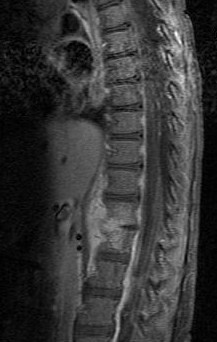Discitis
Editor-In-Chief: Prab R Tumpati, MD
Obesity, Sleep & Internal medicine
Founder, WikiMD Wellnesspedia &
W8MD medical weight loss NYC and sleep center NYC
| Discitis | |
|---|---|

| |
| Synonyms | N/A |
| Pronounce | N/A |
| Specialty | N/A |
| Symptoms | Back pain, fever, neurological deficits |
| Complications | Spinal abscess, sepsis, paralysis |
| Onset | Gradual |
| Duration | Weeks to months |
| Types | N/A |
| Causes | Bacterial infection, viral infection |
| Risks | Immunosuppression, spinal surgery, intravenous drug use |
| Diagnosis | MRI, blood culture, biopsy |
| Differential diagnosis | Vertebral osteomyelitis, epidural abscess, herniated disc |
| Prevention | N/A |
| Treatment | Antibiotics, pain management, surgery |
| Medication | N/A |
| Prognosis | Variable, depends on early diagnosis and treatment |
| Frequency | Rare |
| Deaths | N/A |
Discitis is an infection or inflammation of the intervertebral disc space that affects different age groups. It is a relatively rare condition, which can lead to severe pain and other complications if not treated promptly.
Causes[edit | edit source]
Discitis can be caused by a variety of factors, including bacterial infection, viral infection, and autoimmune disease. The most common cause is bacterial infection, often following a surgery or injury to the disc space. The bacteria can enter the disc space through the bloodstream or from a nearby infection.
Symptoms[edit | edit source]
The most common symptom of discitis is severe pain in the affected area. The pain is often worse when the patient is moving or putting pressure on the spine. Other symptoms can include fever, chills, and general discomfort or malaise.
Diagnosis[edit | edit source]
Diagnosis of discitis is often challenging due to its rare occurrence and non-specific symptoms. It typically involves a combination of medical history, physical examination, and imaging tests such as MRI or CT scan. In some cases, a biopsy of the disc space may be required to confirm the diagnosis.
Treatment[edit | edit source]
Treatment for discitis typically involves antibiotics to treat the infection, along with pain management to relieve the symptoms. In severe cases, surgery may be required to remove the infected disc and stabilize the spine.
Prognosis[edit | edit source]
With prompt and appropriate treatment, most patients with discitis can recover fully. However, if left untreated, discitis can lead to serious complications such as spinal abscess, bone infection, and spinal deformity.
See also[edit | edit source]
| Spinal disease | ||||||||||||||
|---|---|---|---|---|---|---|---|---|---|---|---|---|---|---|
|
Search WikiMD
Ad.Tired of being Overweight? Try W8MD's physician weight loss program.
Semaglutide (Ozempic / Wegovy and Tirzepatide (Mounjaro / Zepbound) available.
Advertise on WikiMD
|
WikiMD's Wellness Encyclopedia |
| Let Food Be Thy Medicine Medicine Thy Food - Hippocrates |
Translate this page: - East Asian
中文,
日本,
한국어,
South Asian
हिन्दी,
தமிழ்,
తెలుగు,
Urdu,
ಕನ್ನಡ,
Southeast Asian
Indonesian,
Vietnamese,
Thai,
မြန်မာဘာသာ,
বাংলা
European
español,
Deutsch,
français,
Greek,
português do Brasil,
polski,
română,
русский,
Nederlands,
norsk,
svenska,
suomi,
Italian
Middle Eastern & African
عربى,
Turkish,
Persian,
Hebrew,
Afrikaans,
isiZulu,
Kiswahili,
Other
Bulgarian,
Hungarian,
Czech,
Swedish,
മലയാളം,
मराठी,
ਪੰਜਾਬੀ,
ગુજરાતી,
Portuguese,
Ukrainian
Medical Disclaimer: WikiMD is not a substitute for professional medical advice. The information on WikiMD is provided as an information resource only, may be incorrect, outdated or misleading, and is not to be used or relied on for any diagnostic or treatment purposes. Please consult your health care provider before making any healthcare decisions or for guidance about a specific medical condition. WikiMD expressly disclaims responsibility, and shall have no liability, for any damages, loss, injury, or liability whatsoever suffered as a result of your reliance on the information contained in this site. By visiting this site you agree to the foregoing terms and conditions, which may from time to time be changed or supplemented by WikiMD. If you do not agree to the foregoing terms and conditions, you should not enter or use this site. See full disclaimer.
Credits:Most images are courtesy of Wikimedia commons, and templates, categories Wikipedia, licensed under CC BY SA or similar.
Contributors: Prab R. Tumpati, MD


